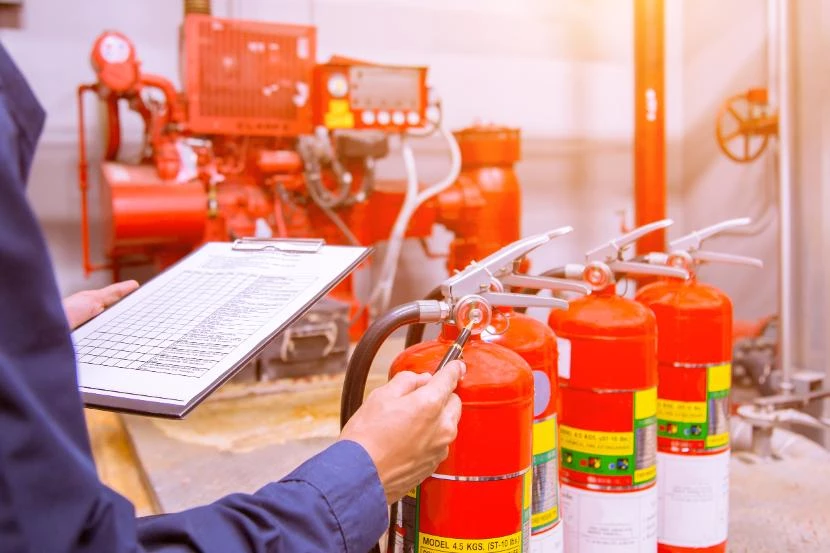
Fire Protection Services in Lancashire
Get In TouchAt Fire Protection Services, we help businesses, landlords, and property managers in Lancashire safeguard their buildings, assets, and occupants against fire risks.
From installing and maintaining essential safety systems to carrying out legally required fire risk assessments, our team ensures full compliance with UK fire safety legislation.
Whether you operate a small office, a large industrial facility, or a multi-occupancy residential block, our tailored solutions ensure you remain compliant while gaining peace of mind.
What is the Meaning of Fire Protection Services?
Fire protection services mean professional systems and practices that prevent, control, and respond to fire risks.
Businesses and property owners use fire protection services in Lancashire because fire causes loss of life, damage to assets, and legal liability.
What does Fire Protection Include?
Fire protection in Lancashire includes active and passive measures that prevent, detect, and control fires. The most common types of fire protection include:
Fire alarms and smoke detectors - These detect smoke and heat early. They protect lives and property because they provide rapid warning of fire.
Sprinkler systems - Automatic sprinklers release water when a fire starts. They control or extinguish flames before they spread.
Fire extinguishers - Portable extinguishers allow trained staff to tackle small fires safely. They reduce the risk of a fire growing out of control.
Emergency lighting in Lancashire - Backup lighting guides people to exits during power failure. It ensures safe evacuation in smoke or darkness.
Fire doors - Specialist fire doors in Lancashire hold back flames and smoke. They give building occupants more time to escape.
Fire-resistant walls and compartmentation - Fire-resistant walls in Lancashire slow down fire spread between rooms or sections of a building. They contain the risk to one area.
Structural fireproofing - Fire-resistant coatings in Lancashire protect steel, concrete, and other materials. They stop buildings collapsing in high heat.
Evacuation planning - Clear escape routes and marked exits save lives. Planned procedures ensure staff and visitors know how to leave safely.
Fire drills - Regular practice prepares people to act quickly and calmly. Drills reduce confusion and panic during a real fire.
Staff fire safety training - Training gives employees the skills to use equipment, raise alarms, and evacuate correctly.
Inspection and maintenance - Regular servicing of alarms, sprinklers, and extinguishers ensures all systems work when needed.
How much does Fire Protection Cost in Lancashire?
The average cost of fire protection is:
Fire risk assessments cost £195 - £1,000
Fire extinguisher servicing (per unit) costs £5 - £15 per extinguisher
Fire alarm installations cost £200 - £450
Fire suppression and fire sprinkler systems cost £25 - £35 per m²
Fire stopping (passive fire protection) costs £20 - £80 per m²
The cost of fire protection services in Lancashire BB5 2 depends on the type of system, property size, and the level of service required.
Costs of fire protection are primarily influenced by the supply and servicing of fire extinguishers, the installation of full fire alarm systems, the inclusion of emergency lighting and sprinklers, and the frequency of ongoing maintenance contracts for compliance.
What are the Requirements for Fire Protection?
Fire protection requirements in the UK come from the Regulatory Reform (Fire Safety) Order 2005 and relevant British Standards. They apply to all non-domestic premises and blocks of flats.
Key fire protection requirements in Lancashire include:
Fire risk assessment in Lancashire - Every building must have a suitable and sufficient fire risk assessment carried out by a competent person.
Fire detection and warning systems in Lancashire - Alarms and detectors must be installed and maintained to provide early warning.
Firefighting equipment - Extinguishers, hose reels, or suppression systems must be provided and kept in working order.
Emergency lighting in Lancashire - Escape routes must be lit if normal lighting fails.
Fire exits and escape routes - Routes must be clearly marked, unobstructed, and wide enough for safe evacuation.
Fire doors and compartmentation - Buildings must include passive fire protection to slow the spread of flames and smoke.
Signage - Fire exit signs and safety instructions must be visible and compliant with regulations.
Training - Staff must receive fire safety training, including how to evacuate and use extinguishers.
Evacuation plans and drills - Buildings must have a written evacuation plan and carry out regular practice.
Maintenance and testing - All fire safety equipment and systems must be inspected, tested, and serviced at required intervals.
These requirements exist because they reduce fire risk, protect life, and ensure compliance with UK fire safety law.
What’s the Process for Designing a Fire Safety Plan for Properties in Lancashire?
The process of a comprehensive fire protection service in Lancashire begins with a fire risk assessment in Lancashire to identify hazards and compliance gaps.
From there, contractors design a bespoke fire safety plan that details evacuation procedures, equipment requirements, and system specifications.
Once agreed, installations are carried out, and staff training can be provided to ensure the plan is practical and effective. The plan is then reviewed regularly to reflect changes in use or layout.
Which Types of Buildings Require Fire Safety Compliance Checks?
Under the Regulatory Reform (Fire Safety) Order 2005, a wide range of buildings in Lancashire must undergo regular compliance checks, including:
Offices and workplaces - Ensuring safe evacuation routes and functional fire detection systems in Lancashire.
Warehouses and industrial facilities - Maintaining firefighting equipment and smoke control measures.
Schools and educational institutions - Protecting staff, pupils, and visitors with compliant safety systems.
Hotels and hospitality venues - Guaranteeing guest safety through alarms, lighting, and evacuation planning.
Residential blocks and flats - Meeting legal obligations for communal areas and escape routes.
Public buildings and community centres - Ensuring safety standards are upheld for public access.
We cover Lancashire
